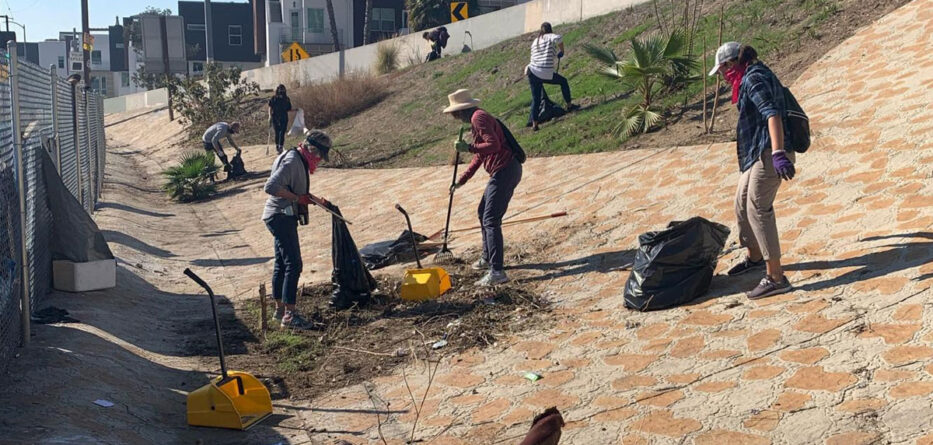On a late August morning, the Echo Park Trash Club approached an underpass below Los Angeles’ 101 Freeway. Months earlier, the city had dismantled a homeless encampment located there during one of its routine sweeps. It was the Trash Club’s first return to the site since its residents had come back to and set up tents on the median between opposing lanes of traffic on Silver Lake Boulevard and in the alcoves where the bridge above intersected with the sloping hillside. Erin Fein, the club’s founder, and the 20-some volunteers came to help clear the encampment of trash – a necessary hygiene service that also helps the community avoid another sweep. They approached the residents, introducing themselves and offering to take any trash they wanted to get rid of. One resident joined the cleanup, sweeping disintegrated pieces of Styrofoam and broken CDs into a dustpan. Two others joined the group photo at the end of the morning.
The environmental movement started with picking up trash. On April 22, 1970, schools and community groups held trash cleanups all across the U.S. Fifty years later, during the COVID-19 shelter-in-place order, the Echo Park Trash Club began bringing together neighbors for the very same activity – but with new significance in the midst of worsening housing and climate crises. The group uses cleanups not only to beautify their neighborhood but also to support its unhoused community, whose trash buildup can result in encampments being dispersed, or “swept.”
Trash buildup is a key factor in the city’s decision to sweep encampments, according to club volunteers, sanitation department workers and housing activists. While the city justifies sweeps on hygiene grounds, they also displace residents, pushing them out of the shelters they rely on to mitigate the effects of extreme heat and weather. The sudden dispersal leaves housing-insecure communities even more exposed to the effects of Southern California’s increasingly hot, and increasingly unpredictable, climate.
Isolated in her studio apartment in spring 2020, Fein thought of the idea of a trash pick-up group to simultaneously address increasing trash in her neighborhood and build community in a socially-distant way. When she put an initial post on the social media network NextDoor, “it exploded with comments.” Others in her community were also worried about the aesthetic aspect of trash-filled streets and its broader environmental impacts, such as the possibility of toxic trash like cigarette butts ending up in the ocean.
During the club’s first pickups, Fein used her own car to bring the filled trash bags back to her apartment dumpster. Others started to help her ferry and unload the trash, but what Trash Club members really wanted was the city’s support. They started, in Fein’s words, “a heavy-duty campaign” of emailing the city to request a sanitation department truck at their cleanups. They went weeks without a response, but one day, a truck showed up. “We were like, huh, that garbage truck is just sitting there,” said Fein. They approached the driver. “Is there any chance you’re here for Echo Park Trash Club?” they asked. The driver said he was.
Once they had a truck regularly coming to the Sunday morning pickups, Fein expanded the club’s efforts to collect trash at the neighborhood’s homeless encampments.
Between 2018 and 2020, homelessness in Los Angeles climbed 32%. Other cities in the West saw similar increases, a symptom of rapidly increasing housing costs and the defunding of social services. Currently, there are an estimated 41,980 unhoused people in LA.
In Echo Park – as in many other neighborhoods – gentrification is part of the reason that many have ended up without housing. At the end of the 1990s, housing prices in the once working-class, majority-Latino neighborhood increased by 50% in three years Today, the neighborhood’s median home value is $1.5 million.
“It’s getting gentrified, so it’s pushing people into corners – there are sometimes 50 or 100 people living in one place. That creates a massive amount of trash,” said Joe Rodriguez, one of the garbage truck drivers who often takes a Trash Club shift. Rodriguez started his career in Los Angeles Sanitation and Environment’s homeless cleanup branch, working as a maintenance laborer for five years before becoming a driver. He said that trash often built up so much at encampments that they had to use an excavator to remove it.
Tensions around Echo Park’s unhoused community came to a head in March 2021, when the city of LA shut down a large encampment at Echo Park Lake, the neighborhood’s central green space. The encampment had formed during the pandemic, when the city was not enforcing its anti-camping laws. As word of an impending sweep spread, protesters came to the community’s defense. But on March 24, 400 police officers entered the park to evict the encampment’s remaining residents, whose numbers had dwindled from around 200 to fewer than 20 as warnings circulated. In the process, they arrested 182 protesters – including some Echo Park Trash Club members – and detained at least 20 journalists.
Though it was uniquely high-profile, the Echo Park Lake sweep wasn’t a singular event: The city of LA undertakes multiple sweeps daily throughout the city. These involve multiple city agencies, including the departments of sanitation, homeless services and police, and are hectic. The Los Angeles police department and the department of sanitation close the area with barrier tape, and “once they do that, you can’t go back in, so people will be rushing to get their things,” said UCLA sociology graduate student Sam Lutzker. “It’s a big issue in terms of losing documents and medicines.”
Just two weeks after the August pickup, Los Angeles experienced a record-breaking heat wave. Unhoused people were some of those most acutely affected by the extreme weather. Addressing housing and environmental crises most meaningfully requires addressing them in tandem. Reducing the urban heat island effect and providing cooling centers, for instance, helps all city residents mitigate and adapt to climate change – but especially those who are directly exposed to the ambient weather. And to keep encampment trash from building up, some cities have created initiatives to pay unhoused residents for trash collection, simultaneously employing those in need of work and keeping the city clean.
Now studying for a master’s degree in psychology, Fein hopes that Echo Park Trash Club can be part of restructuring sweeps to center encampment residents’ health, hygiene and sanitation needs, including trash pickup and mobile showers. “If they were led by gentle people with mental health-realm experience, they could do it in a helpful way: provide lunch, put belongings into tubs, clean the area and then set it back up together,” she said.
Rodriguez said Fein has already made a difference. “Trash Club is a big accomplishment for the city,” he said. “It’s hard to do as much as Erin has done. I hope people piggyback on her work.”
Caroline Tracey wrote this article for High Country News.






